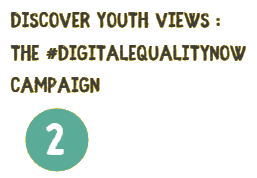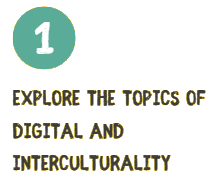Interculturality and civic engagement of young people in the digital age
Get to know more on the importance of intercultural experience for young people’s civic engagement pathways
Intercultural experiences create a climate of mutual respect by embracing and valuing the diverse cultural backgrounds of each individual. Culture is not static; it is dynamic and continually reshaped by economic, political, and social contexts, as well as by our interactions with others. Engaging with people from different cultures provides opportunities for both personal and collective evolution, as we share and learn from each other’s ideas, traditions, values, and perspectives.
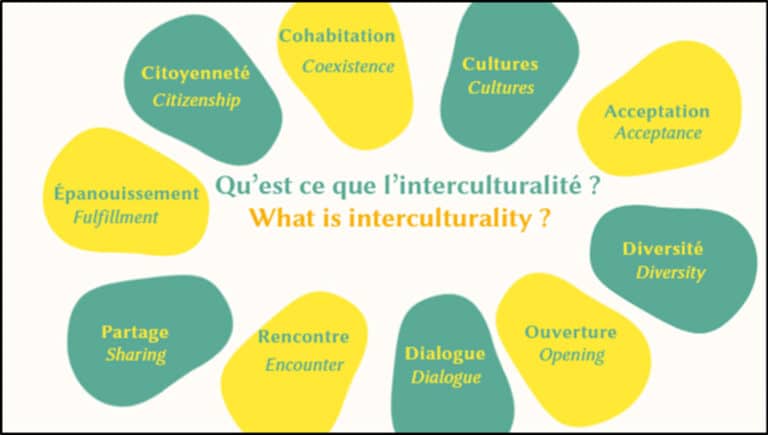
Young people associate interculturality with different concepts and ideas, but this understanding varies within our sample. Some young people were unaware of the term ‘interculturality’ or had difficulty defining it, perhaps a question of familiarity with the term itself, particularly for those who have not had the opportunity to explore intercultural spaces or participate in meaningful cultural interactions. Furthermore, interculturality is a relatively complex and specific concept, which may not be widely known or used in certain contexts.
These intercultural exchanges have the potential to foster mutual understanding and build a shared world. For instance, discussions between individuals from different cultural backgrounds can lead to greater empathy and cooperation, reducing the likelihood of misunderstandings, aggression, or even violence. The goal is to create an environment where every cultural perspective is respected and valued.
Such intercultural experiences can occur on various scales. Locally, you might meet people from different countries in your own neighborhood or city, while globally, traveling to other countries or continents provides more immersive experiences. For example, studying abroad or participating in international work exchanges often offers rich intercultural encounters that can be transformative. However, it’s widely recognized that travel can significantly enhance these experiences by allowing deeper cultural immersion.
We observe here that a majority of young people have had an intercultural experience
through an immersive experience (This reveals a strong correlation with the notion of travel, and that it is more common to have an intercultural experience through this means.
However, we also emphasize that this can be experienced locally, it can take multiple forms, but were not specified in our study. Also, we note that young people have had an intercultural experience online. We can assume that this is due to the rise of technological tools and new post-covid practices.
This shows that interculturality does not only involve travel, but can be understood in diverse and varied ways despite the predominance of immersive experiences.
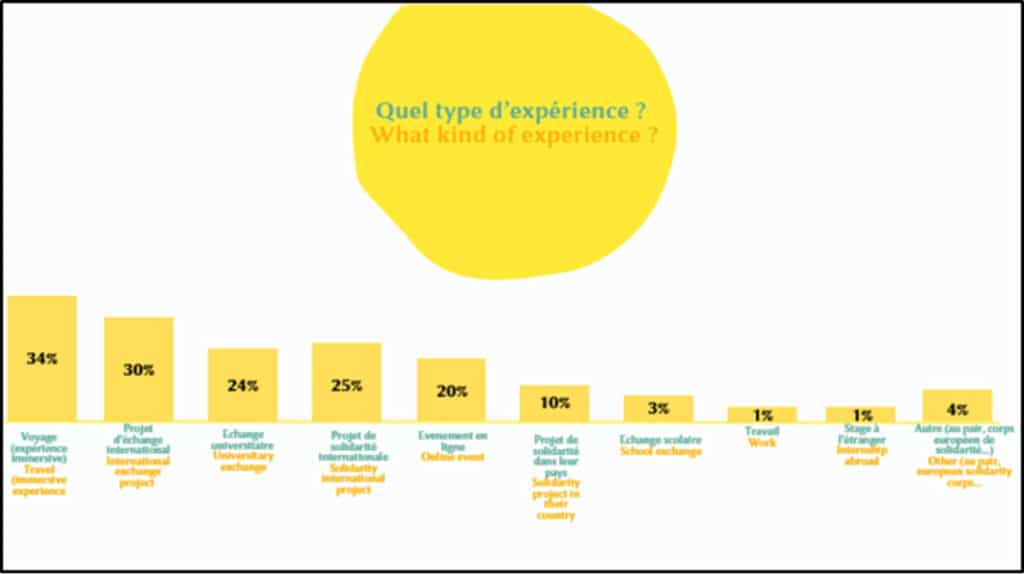
Our study indicates that the ability to move across cultures, whether physically or virtually, plays a crucial role in personal development. It can lead to transformative experiences that inspire individuals to engage more actively in society.
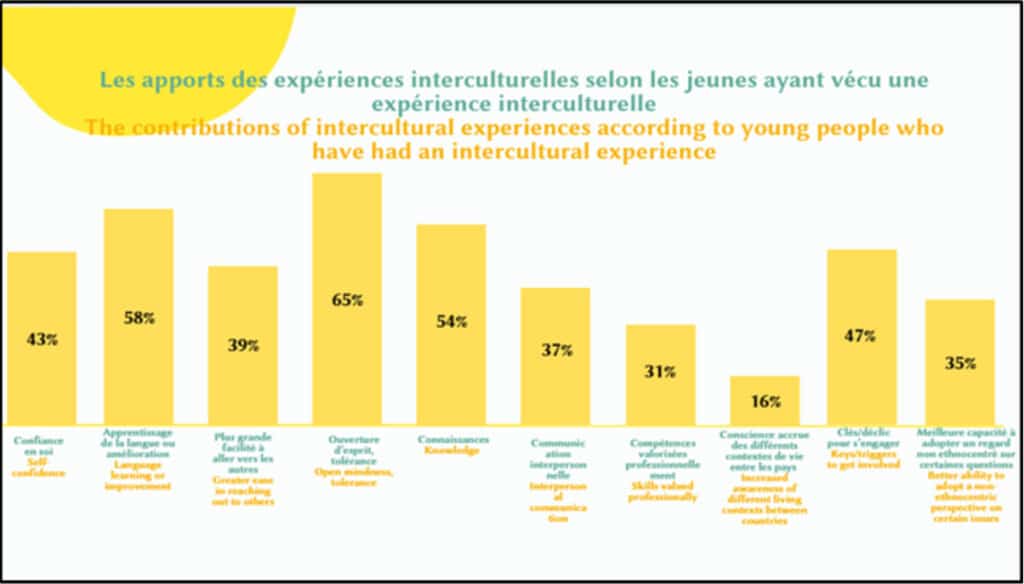
The results show that interactions with other cultures have fostered a better understanding and acceptance of differences, thus contributing to the construction of a more inclusive society, the importance of intercultural communication and mastery of several languages in an increasingly globalized world, indicating that these experiences have enriched their intellectual baggage and understanding of the world. In short, these results highlight the importance of intercultural experiences in the personal development of young people, by promoting open-mindedness, language learning, self-confidence and the acquisition of valuable cultural knowledge.
However, barriers such as borders, visa regulations, financial constraints, and pandemics can limit these opportunities. Indeed, our survey analysis and study has shown that – while intercultural experiences offer invaluable opportunities for personal growth and global understanding – various barriers can restrict access to these exchanges. A key obstacle for many young people is the lack of information—41% report being unaware of the opportunities available to them. This points to a crucial need for improved access to resources and clearer communication about the benefits of intercultural experiences. Mobility restrictions, such as complex visa regulations, affect 32% of young people, adding administrative hurdles that can discourage participation. Time constraints, experienced by 30%, also pose challenges, as educational, professional, and personal commitments often limit the ability to engage in such programs. Another significant barrier is cultural bias, with 27% expressing apprehensions about encountering prejudice, underscoring the need for greater efforts to foster tolerance and understanding. Moreover, recent border closures due to the pandemic (19%) have revealed the vulnerability of in-person exchanges and the need for digital alternatives. Additionally, concerns around political instability (14%) and safety issues add further complexity, making it clear that inclusive, accessible, and secure platforms are essential for enabling intercultural encounters in today’s world.
The young people pay particular attention to language barriers, rejection of others, and visa-related obstacles. In contrast, youth workers are more sensitive to young people’s psychological and practical concerns, such as fear and apprehension as well as lack of time.
These differences can be attributed to the unique experience and perspective of each group. Young people, as direct participants, are more aware of the concrete challenges they face, while youth workers, as external observers, are more sensitive to psychological and practical aspects.
These divergent perspectives highlight the need to actively involve young people in the design of intercultural programs, taking into account their linguistic, security and administrative concerns, while providing emotional and practical support to overcome their fears and time constraints.
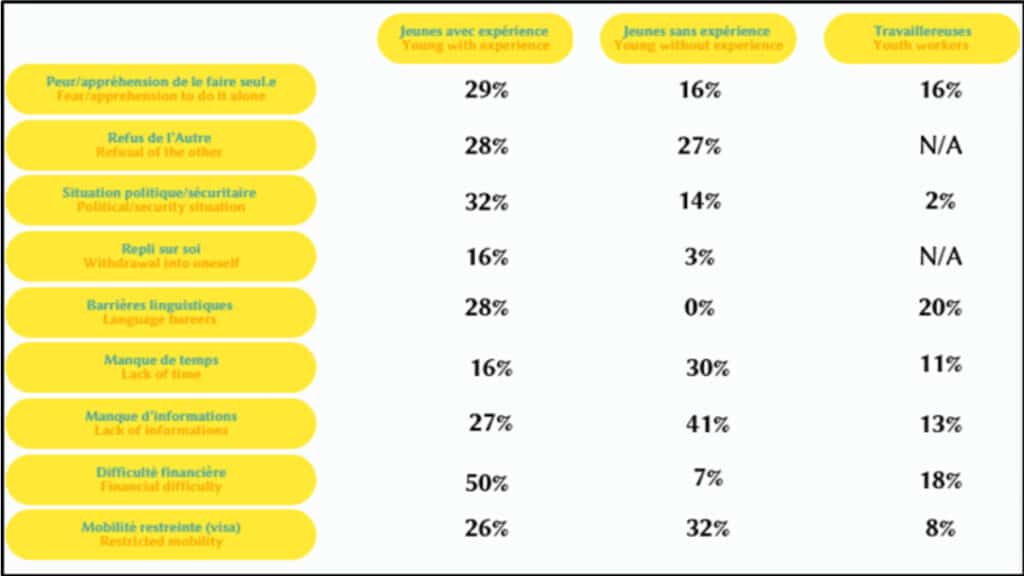
To go further on the topic of interculturality:
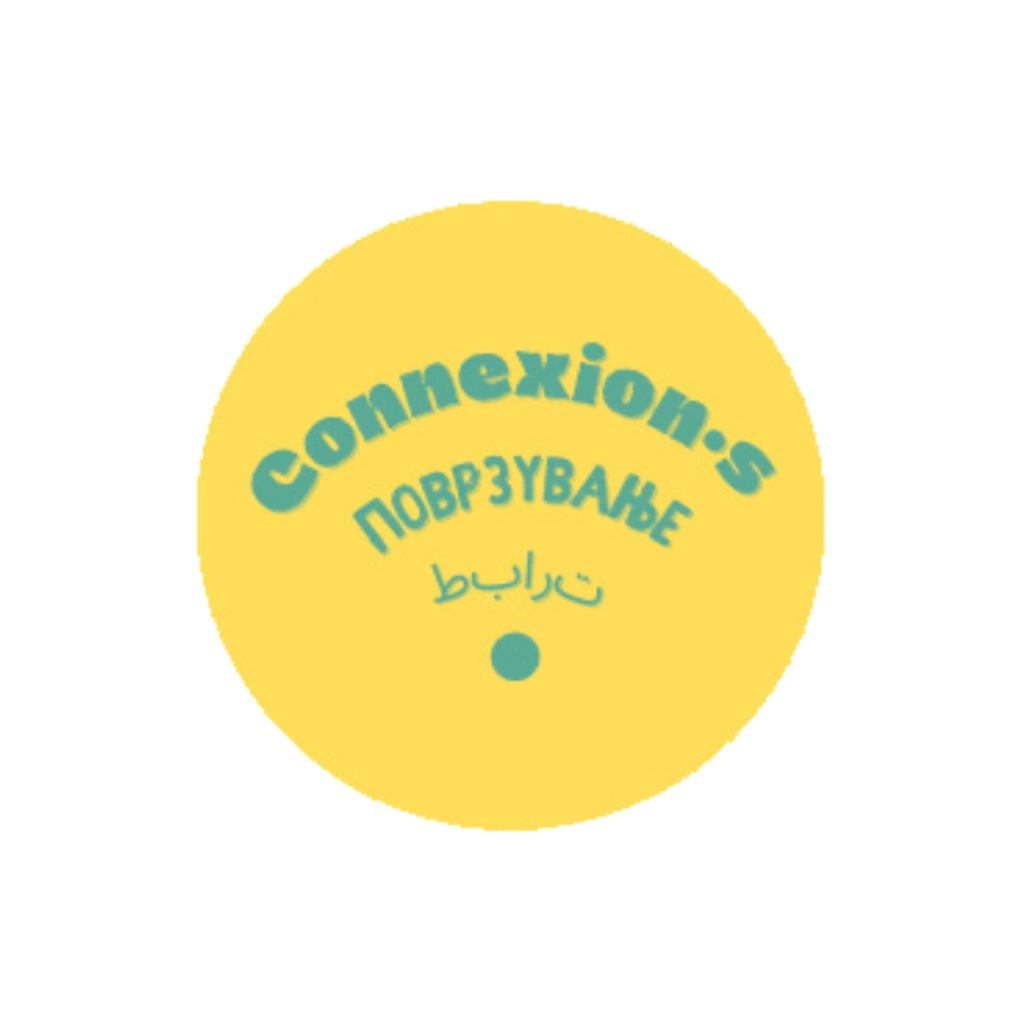
Discover our results’ analysis on the view and realities of youth regarding intercultural experiences
Read our Study focusing on the contexts, realities and needs of youth in 4 countries for more intercultural experiences and digital use


Play our board game “Objectiv’interculturality” to experience the inequalities and privileges in accessing a various scale of intercultural experiences
What does interculturality have to do with ... digital ?
Digital tools: an opportunity for interculturality
Intercultural interactions offer both advantages and challenges. Traditionally, these exchanges have been linked to physical mobility, but this often comes with obstacles like visa restrictions, travel costs, and accommodations. The COVID-19 pandemic, which disrupted these traditional methods, showcased how digital technology could address these limitations. With borders closed, digital tools became a vital alternative to continued intercultural collaboration.
Digital technology allows for remote collaboration, such as teleworking and international partnerships, enabling people to connect and work together across distances. Virtual conferences and online collaborative projects provide platforms for individuals from different countries to share viewpoints and work towards common goals without the need for physical travel. For instance, cultural organizations can leverage these tools to share cultural experiences and promote awareness on issues such as racism, interculturality, and gender abuse to a broader audience. Educational institutions have also embraced this shift, with universities creating e-learning platforms and MOOCs, to maintain access to education during lockdowns.
One concrete example of digital intercultural exchange is the Connexion·s project, which connected young people from France, Tunisia, North Macedonia, and Belgium through both physical mobility and virtual interactions. The final activity of the project, conducted entirely online, demonstrated the challenges of digital access, including internet connectivity issues, hardware variations, and various usage habits. However, it also showcased the enthusiasm of young people to collaborate, share perspectives, and pursue common objectives, regardless of physical distance.
Digital tools offer a way around traditional barriers, fostering civic engagement and collaboration on a global scale. Yet, to maximize their potential, it is essential to promote thoughtful and respectful intercultural communication. This means understanding and valuing the symbols and values of other cultures while allowing others to appreciate one’s own. The Connexion·s project culminated in a social media campaign that raised awareness about digital access inequalities and advocated for equal opportunities in the digital realm, stressing the importance of informed participation and inclusion.
Digital technology is a way of getting round certain obstacles and strengthening civic commitment, but it can itself be an obstacle and it is necessary to make conscious use of digital tools. Indeed, as we could see in the “Guide of Good practice”, digital can be a real alternative to in-person’s experiences.
The obstacles to efficient and responsible digital interculturality
Despite its benefits, digital technology presents its own set of challenges, which must be addressed to ensure responsible and inclusive intercultural exchanges. One notable concern is the environmental impact. While digital communication reduces the need for air travel, it still requires significant energy and resources. Data centers that store and manage digital information consume large amounts of electricity and water, contributing to CO2 emissions. Additionally, the extraction of minerals necessary for manufacturing digital devices often disrupts ecological systems, perpetuating global inequality, as extraction occurs primarily in the Global South while consumption is concentrated in the Global North.
Disparities in digital access also pose significant barriers. Unequal distribution of internet cables leads to better connectivity in northern regions, leaving southern regions with limited access. This was a challenge faced during the Connexion·s project, as varying levels of internet access influenced the ability of participants to fully engage in online activities. These issues highlight the need for greater equality in digital infrastructure and access.
Privacy and data protection are other critical issues. The exploitation of user data for commercial purposes is a growing concern, with the phrase “if it’s free, then you are the product” often cited to highlight the risks. Ensuring the security and privacy of users is a significant challenge in digital intercultural interactions.
Inclusivity must also be a priority when utilizing digital platforms. Language barriers, attention disorders, and physical limitations such as color blindness can all hinder participation. Moreover, the anonymity of the digital environment can sometimes lead to inappropriate behavior, with individuals feeling disconnected from the consequences of their actions. Ensuring respectful and productive communication requires continuous effort.
Finally, the digital environment presents difficulties in maintaining engagement. Staying focused and interested during online experiences is often harder than in face-to-face interactions. As seen in the Connexion·s project, digital interactions require careful management to ensure that all voices are heard, and that collaboration remains efficient and inclusive.
To make informed decisions about the use of digital versus face-to-face approaches, it is essential to weigh the environmental, social, and accessibility factors. The most appropriate method will depend on the specific context of the project, considering factors such as target audience, location, and resources available.
Lorem ipsum dolor sit amet, consectetur adipiscing elit. Ut elit tellus, luctus nec ullamcorper mattis, pulvinar dapibus leo.
Play our quizz to get to know the impact of digital
To go further on the topic of digital :

Assess your own digital skills with the European Commission online test: Digital Skills Assessment Tool (europa.eu)
